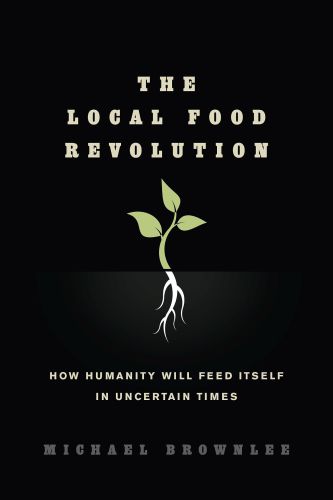
The Local Food Revolution
How Humanity Will Feed Itself in Uncertain Times
فرمت کتاب
ebook
تاریخ انتشار
2016
نویسنده
Michael Brownleeناشر
North Atlantic Booksشابک
9781623170011
کتاب های مرتبط
- اطلاعات
- نقد و بررسی
- دیدگاه کاربران
نقد و بررسی

August 15, 2016
Brownlee, cofounder of the nonprofit Local Food Shift Group, emerges as an “evolutionary catalyst”: an organizer and visionary seeking to address the global food crisis by empowering local communities to achieve “self-reliance in energy, food, and economy.” He shows that the global industrial food system, profoundly enmeshed in transnational corporate profiteering and dependent on a dwindling supply of fossil fuels, “has itself become the greatest threat to humanity’s being able to feed itself,” undermining communities’ ability to provide for their citizens while also polluting the environment and weakening local economies. As the security of the world’s food sources is bound inextricably with the precarious fate of the climate, the uncertain state of global energy, and vanishing natural resources including soil and water, Brownlee issues a passionate summons to “relocalize” before it is too late. Rooted in his own story of working to reestablish the “foodshed” of Boulder, Colo., Brownlee’s handbook for community-level relocalization offers practical strategies for restoring economic and food sovereignty alongside multidisciplinary research, anecdotes, and seeds of wisdom from thinkers across many fields. Anyone interested in wresting back control over our food supply and confronting the “Long Emergency” of our global food and energy crisis will want to join Brownlee’s revolution.

An argument that "modern industrial farming amounts to one of the most destructive enterprises on the planet."According to Brownlee, the co-founder of the nonprofit advocacy group Local Food Shift and co-publisher of its eponymous magazine, the bonds of community are weakened when family farmers are replaced by large corporations motivated solely by profit. The author offers the persuasive argument that even though corporate farming reliably delivers low-cost, abundant food, it degrades the environment and strips food of nutritional value. Brownlee believes that a food revolution, modeled on the 1960s civil rights movement, can change this. A first step, he writes, is to organize "an independent and parallel system" to market local produce while pressuring supermarkets to provide shelf space. This type of massive undertaking would entail meticulous organization of broad-based community support. Brownlee describes how he and a group of fellow activists launched the Boulder County Going Local! campaign on March 15, 2007, at a meeting attended by 250 people. They focused on the perilous state of the environment to mobilize support for local food producers. Their hope--that within 10 years, food grown in Boulder County would account for 25 percent of the market--proved to be overly optimistic, but the author and his associates have not given up the fight. They have engaged in national outreach to similar organizations and have broadened their perspective to include a spiritual dimension to their message, which pops up somewhat awkwardly throughout the narrative. "The fundamental design of the universe calls forth a species of cocreators...to be the vehicle through which the fourteen-billion-year process of evolution becomes not only conscious but also limitless, as if God is at last awakening in the human species," he writes. Brownlee admits that achieving their goal is a monumental project with no guarantees of success, but it must be undertaken. A useful, if not original, statement of the centrality of food production to our way of life that could have benefited from a more concise, organized formulation. COPYRIGHT(1) Kirkus Reviews, ALL RIGHTS RESERVED.

























دیدگاه کاربران